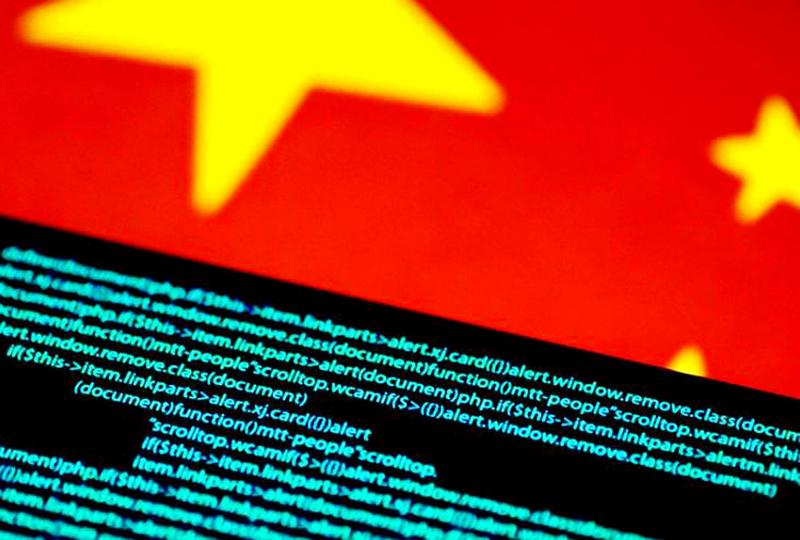Government agencies should prepare to implement an administrative order regarding the procurement of enhanced cybersecurity for information technology (IT) systems, while at least 5 percent of every project’s funding should be used to improve cybersecurity, the Executive Yuan said.
Agencies must submit a written explanation if they fail to do so, or enact compensatory measures, the Executive Yuan said.
Government agencies are often targeted by Chinese cyberattacks and the order is to address an apparent lack of attention to IT systems at government agencies, especially when such work is subcontracted to cybersecurity firms, the Executive Yuan said.

Photo: Reuters
Subcontractors that bid on cybersecurity projects outsourced by government agencies must do so in accordance with the Government Procurement Act (政府採購法), while there should not be a minimum estimate of costs and capability should be prioritized, the order says.
If a subcontractor fails to meet the requirements, it must provide reasons for its shortcomings and describe how it would ensure cybersecurity to be eligible to bid for government contracts, it says.
When establishing or maintaining a cybersecurity system, agencies must assess the level of security needed and what resources could be allocated to the procurement process, it says.
The agencies should also assess what level of IT and cybersecurity proficiency their employees should have, it says.
Agencies must have their resident IT technicians work with the Executive Yuan’s IT management division to ensure that systems follow cybersecurity protocols, such as maintaining login systems, backing up data, fine-tuning systems, upgrading servers and maintaining the server environment, the Executive Yuan said.

The Ministry of the Interior (MOI) is to tighten rules for candidates running for public office, requiring them to declare that they do not hold a Chinese household registration or passport, and that they possess no other foreign citizenship. The requirement was set out in a draft amendment to the Enforcement Rules of the Public Officials Election and Recall Act (公職人員選舉罷免法 ) released by the ministry on Thursday. Under the proposal, candidates would need to make the declaration when submitting their registration forms, which would be published in the official election bulletin. The move follows the removal of several elected officials who were

The Republic of China (ROC) is celebrating its 114th Double Ten National Day today, featuring military parades and a variety of performances and speeches in front of the Presidential Office in Taipei. The Taiwan Taiko Association opened the celebrations with a 100-drummer performance, including young percussionists. As per tradition, an air force Mirage 2000 fighter jet flew over the Presidential Office as a part of the performance. The Honor Guards of the ROC and its marching band also heralded in a military parade. Students from Taichung's Shin Min High School then followed with a colorful performance using floral imagery to represent Taiwan's alternate name

FOUR DESIGNATED AREAS: Notices were issued for live-fire exercises in waters south and northwest of Penghu, northeast of Keelung and west of Kaohsiung, they said The military is planning three major annual exercises across the army, navy and air force this month, with the navy’s “Hai Chiang” (海強, “Sea Strong”) drills running from today through Thursday, the Ministry of National Defense said yesterday. The Hai Chiang exercise, which is to take place in waters surrounding Taiwan, would feature P-3C Orion maritime patrol aircraft and S-70C anti-submarine helicopters, the ministry said, adding that the drills aim to bolster the nation’s offshore defensive capabilities. China has intensified military and psychological pressure against Taiwan, repeatedly sending warplanes and vessels into areas near the nation’s air defense identification zone and across

COVETED PRIZE: The US president would be a peace prize laureate should he persuade Xi Jinping to abandon military aggression against Taiwan, William Lai said US President Donald Trump should get the Nobel Peace Prize should he be able to convince Chinese President Xi Jinping (習近平) to abandon the use of force against Taiwan, President William Lai (賴清德) told a conservative US radio show and podcast in an interview. The US is Taiwan’s most important international backer, despite the absence of formal ties, but since Trump took office earlier this year he has not announced any new arms sales to the nation. Trump could meet Xi at the APEC summit in South Korea on Oct. 31 and Nov. 1. Lai, speaking on The Clay Travis and Buck Sexton